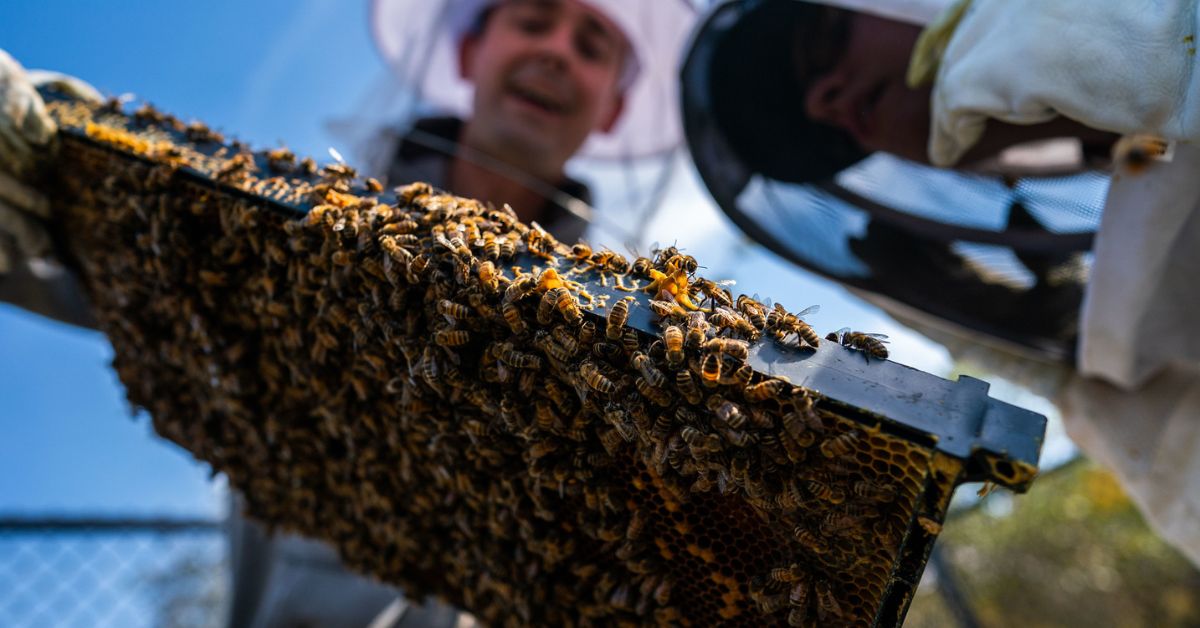
After nine consecutive years as a Tree Campus USA,
Bellarmine University is now a Bee Campus USA.
 Both programs recognize institutions committed to biodiversity on campus. The Arbor Day Foundation administers Tree Campus USA. The Bee Campus USA program, which recognizes communities that are working to conserve native pollinators, is an initiative
of the Xerces Society for Invertebrate Conservation. The society is named for the Xerces blue (Glaucopsyche xerces), believed to be the first North American butterfly species to become extinct because of urban development.
Both programs recognize institutions committed to biodiversity on campus. The Arbor Day Foundation administers Tree Campus USA. The Bee Campus USA program, which recognizes communities that are working to conserve native pollinators, is an initiative
of the Xerces Society for Invertebrate Conservation. The society is named for the Xerces blue (Glaucopsyche xerces), believed to be the first North American butterfly species to become extinct because of urban development.
“The program aspires to make people more PC—pollinator conscious, that is,” said Scott Hoffman Black, Xerces’ executive director. “If lots of individuals and communities begin planting native, pesticide-free flowering trees,
shrubs and perennials, it will help to sustain many, many species of pollinators.”
Each campus chooses their own steps to conserve pollinators, said Bee Campus USA coordinator Laura Rost. “Affiliates play to their own strengths.”
At Bellarmine, “we’ve been adding native pollinator gardens, doing invasive-species removals and reducing mowing and pesticide-spraying at the Bellarmine Farm,” said Dr. Kate Bulinski, associate professor of Geoscience in the Department of Environmental Studies and advisor
to the Bellarmine Beekeeping Club,
which was founded two years ago.
The club built and installed several hives for honeybees amid the farm’s fruit trees in summer 2022. While honeybees are good pollinators, they are not among the roughly 3,600 species of bees native to the United States—they were imported
from Europe.
 So this year, students plan to construct native-bee houses, Bulinski said. “When people say, ‘Save the bees,’ they usually mean honeybees,” she said. “Keeping honeybees is good for pollination, but promoting native bee and
insect populations is better for biodiversity. We do both.”
So this year, students plan to construct native-bee houses, Bulinski said. “When people say, ‘Save the bees,’ they usually mean honeybees,” she said. “Keeping honeybees is good for pollination, but promoting native bee and
insect populations is better for biodiversity. We do both.”
Pollinators enable the reproduction of over 85 percent of all flowering plants and 67 percent of agricultural crops, according to the Xerces Society. Bees are the most important pollinator, but butterflies, moths, beetles, flies, wasps, bats and hummingbirds
also contribute to pollination.
Research has shown significant declines in native pollinator populations, with up to 40 percent of pollinator species globally at risk of extinction in the coming years through habitat loss, the use of harmful pesticides and climate change.
“I think it is important for Bellarmine to engage in beekeeping and the farm because we only have one Earth and need to do everything we can to keep it healthy for future generations,” said Averi Smith, a senior English major from Louisville
who is vice president of the Beekeeping Club.
“Every small action someone does that can help the Earth and our environment is important. Not only is the club beneficial for the Earth, but also for the students participating in it. It is a great place to meet friendly people and learn new skills.”
 Averi has donned a bee suit several times to check on the hives. “I love looking at the bees moving around in their hives,” she said. “I participated in about three or four checks over the summer, and each time it was a new experience.”
Averi has donned a bee suit several times to check on the hives. “I love looking at the bees moving around in their hives,” she said. “I participated in about three or four checks over the summer, and each time it was a new experience.”
But the biggest reward of beekeeping so far, she said, is the honey. “We completed our first honey harvest just before the start of the semester, and I have to say it is the best honey I have had. I do have a biased opinion, but it has floral notes
that are unlike any other honey I have tasted.”